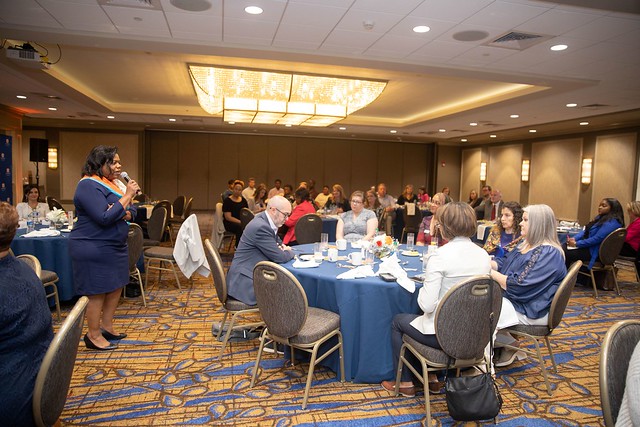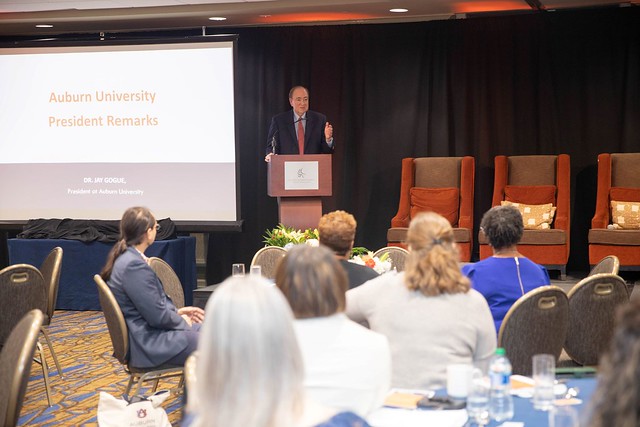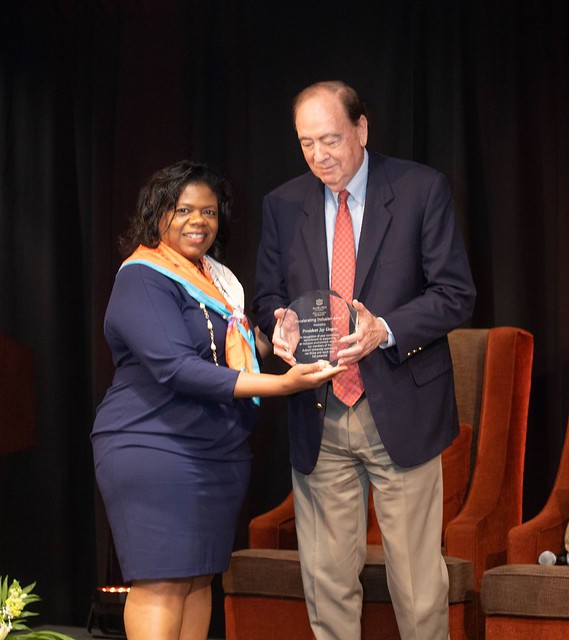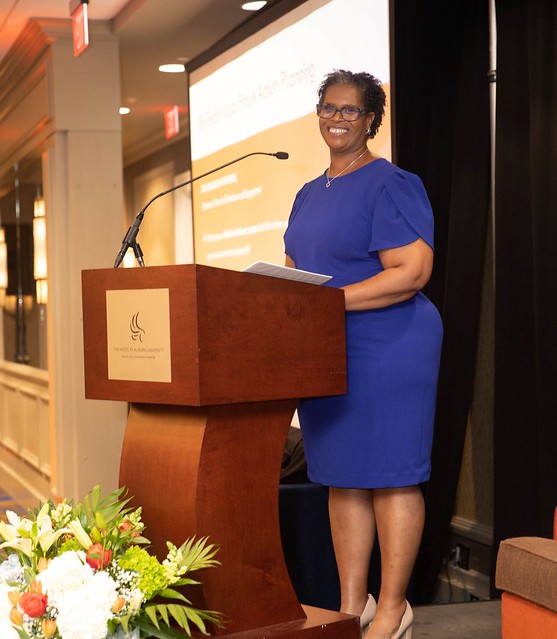Auburn University highlights DEI progress, goals during inaugural State of Inclusion and Diversity event
Article body
Auburn University’s Office of Inclusion and Diversity, or OID, hosted the inaugural State of Inclusion and Diversity event on Thursday, April 14, to reflect and reaffirm the land-grant institution’s commitment to diversity, equity and inclusion, or DEI, while highlighting the significant steps that have been made in the past year.
Students, faculty and staff came together at The Hotel at Auburn University and Dixon Conference Center to hear from some of the university’s esteemed campus leaders about how far Auburn has come and the proactive measures the institution is taking to create a more inclusive and respectful campus for all. In the nearly two years since the start of the pandemic, Auburn has restated its efforts to promote diversity, equity and inclusion on campus.
“I am so incredibly proud of Auburn’s progress in advancing diversity efforts this past year,” said Taffye Benson Clayton, associate provost and vice president for Inclusion and Diversity. “We are lucky to have had today to showcase that great work. I hope today served as a testament to everyone of all that the Auburn Family can accomplish when we have a university-wide commitment on an issue.”
Clayton’s remarks highlighted Auburn’s historical moments, such as when Harold A. Franklin, who was honored with an expanded desegregation marker courtyard in 2021, became the first African American student to enroll in Auburn. Her presentation emphasized the current comprehensive efforts to enhance diverse representation on campus through continued outreach and extensive scholarship opportunities. University efforts like Tiger Takeoff and Experience Auburn, combined with scholarships like the Ever Auburn Scholarship and the Together We Will Scholarship, have meaningfully affected enrollment with a 20-percent increase in new Black freshmen and transfer students last fall.
Auburn President Jay Gogue attended the event, presenting awards and affirming the importance of a diverse and inclusive campus by recounting an analogy from his background in agriculture and with the Department of the Interior.
“Our focus was on ecosystem management, and one of the things that was emphasized, particularly by the ecologists, is that diversity equals stability,” said Gogue, who was surprised with an award from Clayton and OID in honor of his commitment to DEI efforts as the institution’s top executive. “Diversity is absolutely critical to a healthy ecosystem, and a university is also an ecosystem. The work you do is incredibly important, and it’s about the diversity of people at the university.
“Y’all are making an incredible difference. Keep it up, we’ve got a long way to go.”
Along with Clayton and Gogue, attendees heard from Vini Nathan, interim provost and vice president for Academic Affairs, who stressed the importance of recommitting the university’s pledge to the promotion of DEI efforts across all channels.
“Auburn’s first State of Inclusion and Diversity is a way for us to rebuild, reaffirm and reflect on our institution's commitment to diversity, equity, inclusion, and justice,” said Nathan, a member of the Presidential Task Force for Opportunity and Equity. “Today is an opportunity to collectively look in the mirror and say, ‘These things we will accept, these things we will not accept, and these things we commit to improving.’”
Attendees were treated to a panel discussion examining the acceleration of progress at Auburn that featured four DEI award recipients: Soledad Peresin, associate professor, College of Forestry and Wildlife Sciences; Tal Peretz, associate professor, College of Liberal Arts; Ana Franco-Watkins, interim dean, College of Liberal Arts; and Bruce Smith, professor, College of Veterinary Medicine. These dedicated individuals have a proven commitment to breaking down barriers and making all members of the Auburn Family feel valued and respected.
During their panel, which was moderated by OID Chief of Staff and Special Assistant JuWan Robinson, they discussed the measures that have been taken and their excitement to see Auburn continue to progress in DEI work in the coming years. Following the discussion, panelists were presented with awards to commemorate their impressive work and the work they will continue to do.
“I am incredibly grateful receive the Accelerating Inclusion DEI award and have the opportunity to participate on the panel with my distinguished colleagues,” Franco-Watkins said. “Systematic change requires buy-in from all members at every level of our institution, from the students, faculty, staff, individual colleges and university leadership. I am confident in our ability to make substantive progress toward inclusive excellence at Auburn University.”
Although distinguished guests and speakers had the opportunity to share insight into Auburn’s commitment to DEI, participants were given discussion prompts at their tables to share experiences and voice their concerns and ideas as the 2021-22 school year concludes and Auburn plans for the coming academic year and beyond. University leadership recognizes that a primary way to achieve progress and equity on campus is by listening to the people who call Auburn home, and Thursday’s session was an illustration of that endeavor in the form of an open-forum action planning session led by Rochelle W. Johnson, director of Diversity Education and Engagement for OID.
In her final remarks, Clayton reflected on the day, the institution’s progress and her excitement for Auburn’s future.
“All members of the Auburn Family deserve a university where they feel respected and their experiences are valued,” Clayton said. “I believe we are building that here together at Auburn University.”
Related Media
Media interested in this story can contact Communications Director Preston Sparks at (334) 844-9999 or preston.sparks@auburn.edu.
Auburn University is a nationally ranked land grant institution recognized for its commitment to world-class scholarship, interdisciplinary research with an elite, top-tier Carnegie R1 classification, life-changing outreach with Carnegie’s Community Engagement designation and an undergraduate education experience second to none. Auburn is home to more than 30,000 students, and its faculty and research partners collaborate to develop and deliver meaningful scholarship, science and technology-based advancements that meet pressing regional, national and global needs. Auburn’s commitment to active student engagement, professional success and public/private partnership drives a growing reputation for outreach and extension that delivers broad economic, health and societal impact.











